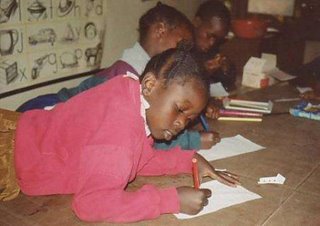Development economists use Tanzania as a measure. If they can haul themselves out of poverty, others can too.
Students at The School of St Jude
According to The Economist, Tanzania is one of east Africa's few good-news stories. The country remains wretchedly poor, inefficient, with little medical care in its remote areas, few roads and with frequent power cuts. But donors, disillusioned by the corruption and/or brutality that goes on elsewhere, are happy to give money to a country that is both peaceful and stable.
The country's GDP growth is expected to be 5.8% this year, rising to 6.7% next year, and inflation has been low for years. Tanzania's relative lack of graft means that some donors now put their money directly into the national budget with few strings attached. Britain has committed to deposit $170m a year into Tanzania's coffers for the next few years—just the kind of predictability of giving that the aid community has called for.
To put this gift of $US170 million into perspective, the NSW Government had a total revenue of $AU41,627million and it budgeted $AU9,667 million for education in 2005-2006.
Seen in this light, the $US170 million from Britain won’t help Tanzania catch up with the developed world, indeed it is barely enough to hold it in its current position at the bottom of the ladder.
Nevertheless, Tanzania has made great strides in education improvement in recent years.
The World Bank reports –
Increased Access : the Net Enrolment Rate (NER) in Tanzania has improved considerably over the past six years, going from 59% in 2000 to 96% in 2006.
Improved Quality: The passrate of students completing primary education, assessed through the Primary School Leaving Examinations (PSLE), has significantly improved. Over the past six years, the Passrate has increased from 22% in 2000 to 62% in 2006. This was achieved thanks to reforms in curriculum content and teaching; increased teacher training, development and deployment; better school support systems; improved ability of schools to purchase textbooks and teaching materials by using grants; and greater community participation in managing school affairs to enhance learning.
These achievements are a massive effort in a country where many village schools have up to four teachers sharing a single classroom – teaching a class in each corner.
Private citizens need to supplement the funding available to the Tanzanian government by supporting good projects. The School of St Jude is a great project that is worthy of your support.

No comments:
Post a Comment